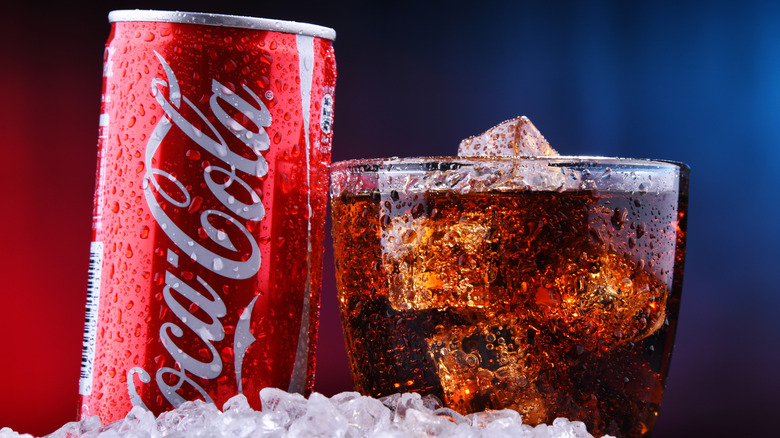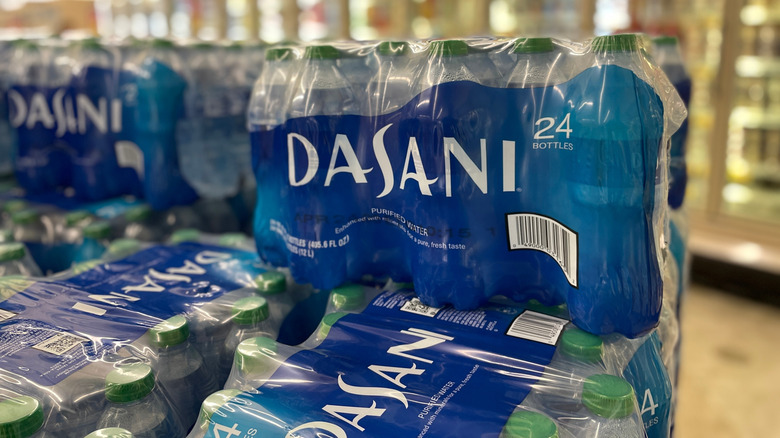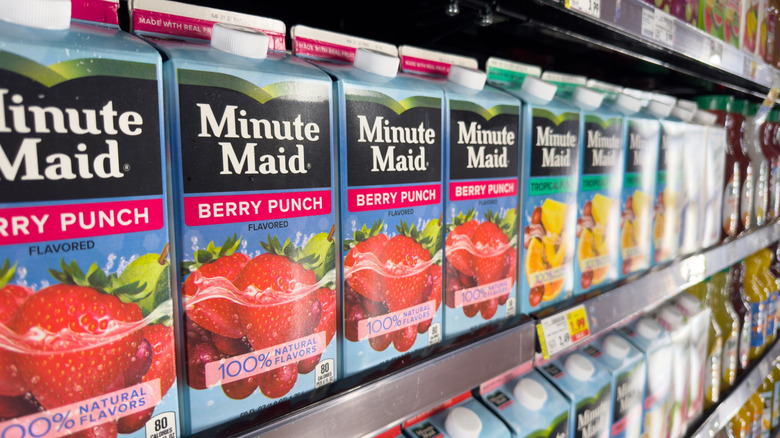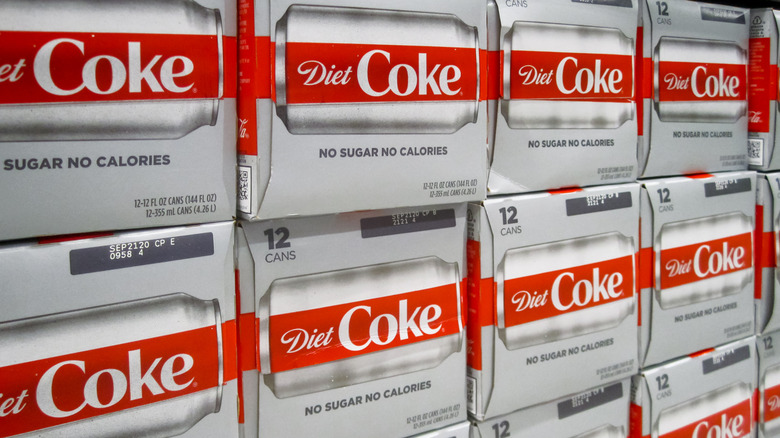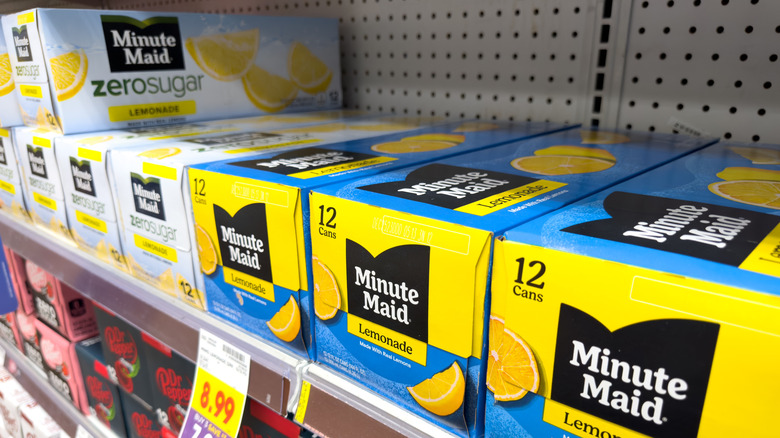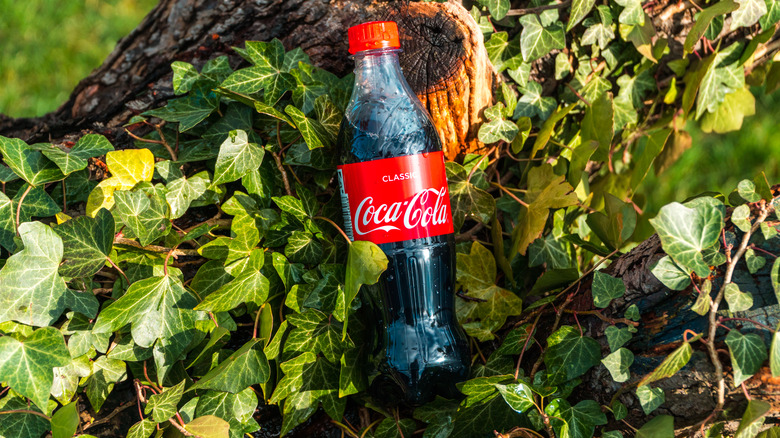The Biggest Recalls In Coca-Cola History
It's hard to discount Coca-Cola's status as a cultural icon. Since its inception at an Atlanta, Georgia pharmacy in 1886, it has grown into one of the biggest soda brands on the planet. It even has its own museum, The World of Coca-Cola, not far from the massive illuminated Coke sign overlooking Atlanta's Woodruff Park.
Today, the Coca-Cola company handles an expansive portfolio of brands besides the obvious players (like Coke, Sprite, and Fanta), with everything from juice to coffee to alcoholic beverages under its umbrella. Given its enormous global footprint, it is unsurprising that the drink giant has been involved in some of the biggest soda recalls in history. These mishaps had the company pulling products from shelves for everything from foreign materials in beverages to misleading labels. So before you restock on your favorite Coke brands, let's dive into some of Coca-Cola's biggest-ever recalls and see how the company handled them.
Dasani's UK debacle
Dasani is a bottled water brand from Coca-Cola that you can find in various parts of the world, including the U.S., Latin America, and Asia. However, you won't find it in the U.K., and that's not just because it's essentially treated tap water sold at a markup (although this fact has led to some scandalous headlines). The reason you can't buy Dasani water in the U.K. is that the company tucked its tail and pulled out of the market with egg on its face.
Just five weeks after the product's 2004 launch in the U.K. something went wrong with a batch of water at the factory, causing bromate to form at levels higher than what the country allows. A byproduct of disinfecting water with ozone, bromate has been linked to various health risks such as gut problems and kidney disease and is potentially carcinogenic. For this reason, most places regulate the amount allowed in food and water or even ban it.
In the U.K., the amount of bromate in water cannot exceed 10 parts per billion, but the sampled Dasani water contained between 10 and 22 parts per billion. Once Coca-Cola discovered this, it issued a voluntary recall as a precaution, pulling around half a million bottles (everything in circulation) off the market. While Coca-Cola didn't officially rule out relaunching Dasani in the U.K., the whole embarrassing ordeal made it pretty difficult for the brand to find its footing again.
Minute Maid mishap
Featuring various takes on lemonade, punch, and aguas frescas, Minute Maid flavors are the definition of refreshing. However, the last thing you want to find in your drink is an object that belongs in a toolbox. Unfortunately for Coca-Cola, which owns the Minute Maid brand, unwelcome bolts or washers found their way into batches of Minute Maid Berry Punch, Strawberry Lemonade, and Fruit Punch products in 2021. This led to a voluntary recall of around 7,500 cases of drinks that had been distributed to Connecticut, Maine, Maryland, New Jersey, New York, North Carolina, Pennsylvania, and Virginia.
The FDA determined this was a Class II recall. In other words, while the product could cause harm, there wasn't a high likelihood of serious or lasting damage. Just about two weeks later, the drink maker also recalled specific batches of Coca-Cola and Sprite cans that had been distributed to military commissaries because they might contain "foreign matter." Luckily, this incident was on a much smaller scale and limited to military bases in the southeastern U.S., so the general public was in the clear.
Canned sodas recalled for foreign material
Just a short two years after the Minute Maid and military commissary recalls, Coca-Cola voluntarily recalled nearly 2,000 cases of soda — Sprite, Diet Coke, and Fanta Orange — in Alabama, Mississippi, and Florida in 2023. Again, it was because some unwanted items may have found their way inside the beverages. United Packers, an Alabama-based distributor, initially notified the government about the situation. Luckily, there were no reports of anyone getting hurt or sick in the incident.
Coca-Cola was less specific about the contamination this time, simply saying the products could potentially contain "foreign material." That could mean anything from insects to stones to bits of plastic, so we can't confirm just what might have made its way into those cans. But within a month, multiple media outlets reported that the company confirmed all of the potentially tainted cans had been successfully pulled off shelves.
Another smaller recall happened the same year, when some cases of Coca-Cola Ultimate Zero Sugar were incorrectly packaged and may have contained original Coke — which could have been problematic for anyone avoiding sugar. However, this only affected 177 cases distributed in Georgia.
Mislabeled Minute Maid
Minute Maid was back in the news in 2024, this time for a labeling mixup. Just over 13,000 12-pack cases of Minute Maid Zero Sugar Lemonade mistakenly contained cans of the full-sugar recipe, which could pose issues for people watching their sugar intake. The cases were distributed to Indiana, Kentucky, and Ohio, and the FDA classified it as a Class II recall.
According to the nutrition info, a 12-ounce can of Minute Maid Lemonade contains 40 grams of added sugar. The American Heart Association recommends no more than 36 grams of added sugar a day for men and no more than 25 grams for women. So, it's easy to see how this could be an issue for anyone who meant to purchase the zero-sugar variety. Plus, people with medical conditions like diabetes can experience serious health complications if they consume too much sugar.
While Coca-Cola said the recall is complete as far as the products on the market, consumers may still have affected cases in their homes. People can check the packaging for the following codes to determine if their items are part of the recall: FEB1725CNA and FEB1725CNB.
Another metal mishap
In October 2024, Coca-Cola issued a massive recall in Austria — one of the largest in the country's history — because of a faulty factory sieve that may have allowed metal fragments into some of the drinks. The company recalled around 28 million Coke, Fanta, Sprite, and MezzoMix (a mix of Coke and orange soda) products in half-liter plastic bottles. It extended to any of the flavors under those brands, so varieties like Fanta Lemon Zero and Coca-Cola Zero Sugar Zero Caffeine were all included.
The recall then expanded to Germany, since some of the affected batches may have made their way across the border. While Coca-Cola said the problem may only affect a very small amount of products, it decided to recall any batches that couldn't be ruled out. Consumers were advised to return the products for a refund, even without a receipt. The company also apologized for the incident and said it would follow up with retailers to make sure the affected bottles were all pulled from shelves.
Earlier in the year, even more metal mayhem happened back in the U.S., when Coca-Cola recalled 24-packs of Powerade over worries they may have had stainless-steel rings inside. This incident affected 902 cases, and the flavors included Powerade Zero Fruit Punch, Powerade Zero Mixed Berry, and Powerade Mountain Berry Blast.
